初中英语说课稿
初中英语说课稿中文版(通用5篇)
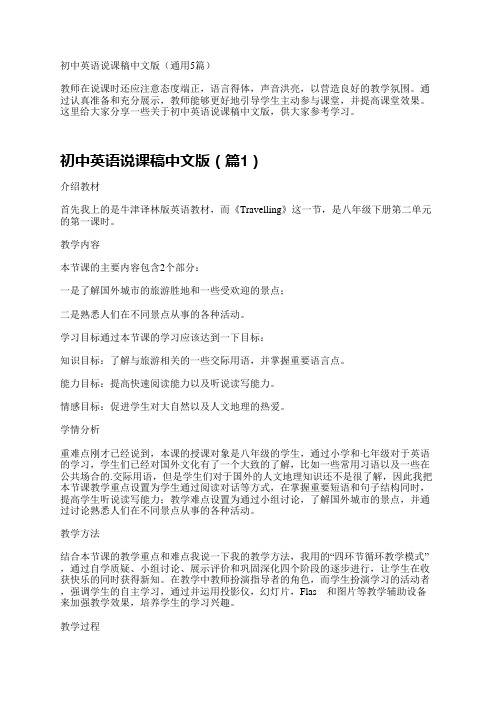
初中英语说课稿中文版(通用5篇)教师在说课时还应注意态度端正,语言得体,声音洪亮,以营造良好的教学氛围。
通过认真准备和充分展示,教师能够更好地引导学生主动参与课堂,并提高课堂效果。
这里给大家分享一些关于初中英语说课稿中文版,供大家参考学习。
初中英语说课稿中文版(篇1)介绍教材首先我上的是牛津译林版英语教材,而《Travelling》这一节,是八年级下册第二单元的第一课时。
教学内容本节课的主要内容包含2个部分:一是了解国外城市的旅游胜地和一些受欢迎的景点;二是熟悉人们在不同景点从事的各种活动。
学习目标通过本节课的学习应该达到一下目标:知识目标:了解与旅游相关的一些交际用语,并掌握重要语言点。
能力目标:提高快速阅读能力以及听说读写能力。
情感目标:促进学生对大自然以及人文地理的热爱。
学情分析重难点刚才已经说到,本课的授课对象是八年级的学生,通过小学和七年级对于英语的学习,学生们已经对国外文化有了一个大致的了解,比如一些常用习语以及一些在公共场合的.交际用语,但是学生们对于国外的人文地理知识还不是很了解,因此我把本节课教学重点设置为学生通过阅读对话等方式,在掌握重要短语和句子结构同时,提高学生听说读写能力;教学难点设置为通过小组讨论,了解国外城市的景点,并通过讨论熟悉人们在不同景点从事的各种活动。
教学方法结合本节课的教学重点和难点我说一下我的教学方法,我用的“四环节循环教学模式”,通过自学质疑、小组讨论、展示评价和巩固深化四个阶段的逐步进行,让学生在收获快乐的同时获得新知。
在教学中教师扮演指导者的角色,而学生扮演学习的活动者,强调学生的自主学习,通过并运用投影仪,幻灯片,Flas__和图片等教学辅助设备来加强教学效果,培养学生的学习兴趣。
教学过程针对本节课的教学重点和难点,我简单地说下我的教学思路:Step one:lead in1.Show a pictureT: Look! This is a beautiful picture, right? (Ask questions)What can you see in the picture?What season do you think it is?2.Guessing Game:I’ll show you some pictures of interesting places I’ve visited before, please guess what places they are. (Students do the guessing game)3. A Braining StormShowing the pictures.Do you want to know more popular tourist attractions?Step Two:Presentation1. Show the pictures of other six places of interest on the Page 25.-- Teach the new words and pronunciation.--Lead them to read the names of places and countries.2. Test your memoryShow the pictures randomly, students say the names loudly.1. Group game(1) Four students a group, practice the following dialogue one by one.I would like to visit … What about you?(2) First practice, and then ask some groups to act it out.2. Match1.match the places with the countries.2.Students say more sentences about the places using the word “symbol”3. Do ExercisesAsk students to fill in the blanks using the places we’ve learnt.Step Three:Dialogue-making1. Things to do when traveling2. Pair Work(1) T: Till now, we’ve learnt so many places and things to do. Could you please use both of them to make a dialogue like this?(2) Students practice making dialogues in pairs using different places and things to do to replace the underlined parts.(3) Students act the dialogue out before the whole class.Step Four: Comic StripT: It’s spring now. Traveling is really great fun. All of us like traveling, so does our friend Eddie. He also wants to go on a trip.1. Students listen to the tape, answer the questionWhere does Eddie want to go?2. Students read the dialogue by themselves, answer more questions3. Show TimeFirst the students practice in pairs, then ask some pairs to act it out.Step Five: Discussion-- Do you think “A heavy bag is suitable for traveling”?-- What things do we need to take with us when we go on a trip?(Students first discuss in pairs, and then answer the questions)You can choose any tourist attraction to make a dialogue with you partners.Students first practice in pairs, and then act the dialogue out.Step Six: Homework1. Learn more about the world.2. Collect some postcards or photos of popular tourist attractions.3. Look for some information about them on the Internet. Write down the information on your note book.初中英语说课稿中文版(篇2)(一)教材分析:这几天不知为什么,手边的东西总是四处乱丢。
初中英语全英说课稿优秀8篇
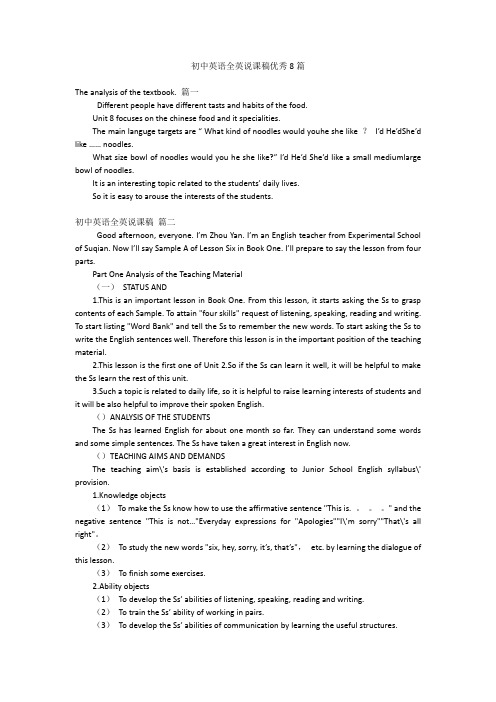
初中英语全英说课稿优秀8篇The analysis of the textbook. 篇一Different people have different tasts and habits of the food.Unit 8 focuses on the chinese food and it specialities.The main languge targets are “ What kind of noodles would youhe she like ?I’d He’dShe’d like …… noodles.What size bowl of noodles would you he she like?” I’d He’d She’d like a small mediumlarge bowl of noodles.It is an interesting topic related to the students’ daily lives.So it is easy to arouse the interests of the students.初中英语全英说课稿篇二Good afternoon, everyone. I’m Zhou Yan. I’m an English teacher from Experimental School of Suqian. Now I’ll say Sample A of Lesson Six in Book One. I’ll prepare to say the lesson from four parts.Part One Analysis of the Teaching Material(一)STATUS AND1.This is an important lesson in Book One. From this lesson, it starts asking the Ss to grasp contents of each Sample. To attain "four skills" request of listening, speaking, reading and writing. To start listing "Word Bank" and tell the Ss to remember the new words. To start asking the Ss to write the English sentences well. Therefore this lesson is in the important position of the teaching material.2.This lesson is the first one of Unit 2.So if the Ss can learn it well, it will be helpful to make the Ss learn the rest of this unit.3.Such a topic is related to daily life, so it is helpful to raise learning interests of students and it will be also helpful to improve their spoken English.()ANALYSIS OF THE STUDENTSThe Ss has learned English for about one month so far. They can understand some words and some simple sentences. The Ss have taken a great interest in English now.()TEACHING AIMS AND DEMANDSThe teaching aim\'s basis is established according to Junior School English syllabus\' provision.1.Knowledge objects(1)To make the Ss know how to use the affirmative sentence "This is. 。
初中英语说课稿范文模板7篇
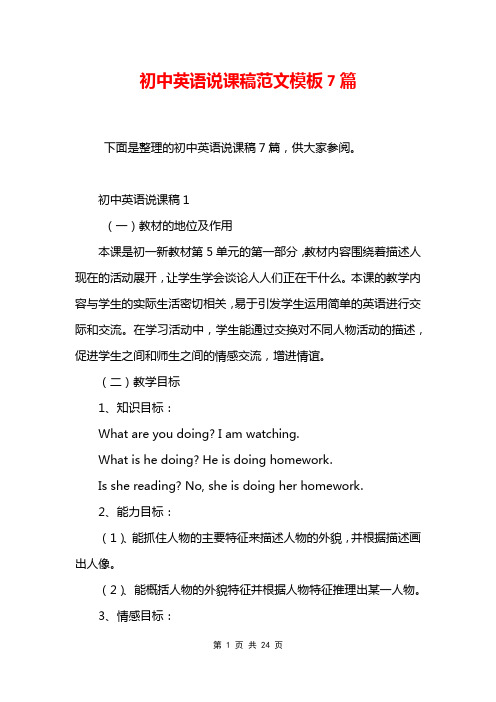
初中英语说课稿范文模板7篇下面是整理的初中英语说课稿7篇,供大家参阅。
初中英语说课稿1(一)教材的地位及作用本课是初一新教材第5单元的第一部分,教材内容围绕着描述人现在的活动展开,让学生学会谈论人人们正在干什么。
本课的教学内容与学生的实际生活密切相关,易于引发学生运用简单的英语进行交际和交流。
在学习活动中,学生能通过交换对不同人物活动的描述,促进学生之间和师生之间的情感交流,增进情谊。
(二)教学目标1、知识目标:What are you doing? I am watching.What is he doing? He is doing homework.Is she reading? No, she is doing her homework.2、能力目标:(1)、能抓住人物的主要特征来描述人物的外貌,并根据描述画出人像。
(2)、能概括人物的外貌特征并根据人物特征推理出某一人物。
3、情感目标:通过描述同学、教师或自己的偶像的外貌,表达自己的看法,使学生在人际交往中学会尊重和理解别人,学会交换不同的看法,了解他人的爱好,增进情谊。
(三)教学重点及难点1、掌握并运用描述人物活动和地点的词汇:watching, doing, eating cleaning, playing, reading, swimming, shopping, pool, school, mall, library2、掌握并运用简单的英语交际句型:What are you doing? I am watching.What is he doing? He is doing homework.Is she reading? No, she is doing her homework.(四)。
教法设计对本课我主要采取了如下几种教法:1.听录音。
听音是英语学习的重要方法,也是课堂教学的重要步骤。
在听中可以感知,可以模仿。
2.重点解释,个别操练。
初中英语说课稿(最新9篇)
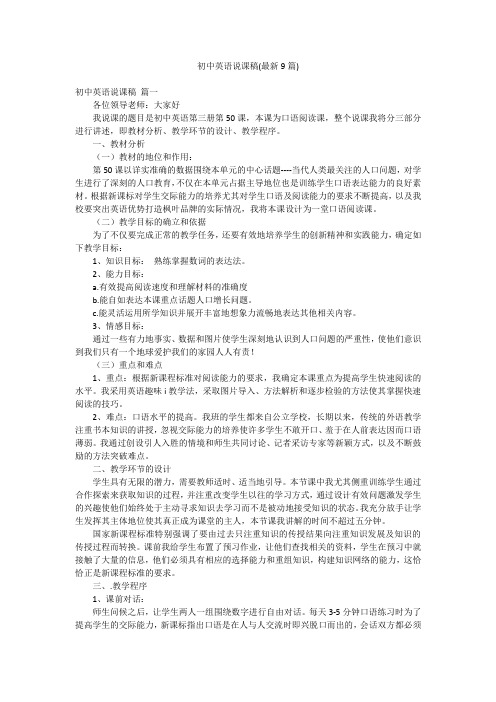
初中英语说课稿(最新9篇)初中英语说课稿篇一各位领导老师:大家好我说课的题目是初中英语第三册第50课,本课为口语阅读课,整个说课我将分三部分进行讲述,即教材分析、教学环节的设计、教学程序。
一、教材分析(一)教材的地位和作用:第50课以详实准确的数据围绕本单元的中心话题----当代人类最关注的人口问题,对学生进行了深刻的人口教育,不仅在本单元占据主导地位也是训练学生口语表达能力的良好素材。
根据新课标对学生交际能力的培养尤其对学生口语及阅读能力的要求不断提高,以及我校要突出英语优势打造枫叶品牌的实际情况,我将本课设计为一堂口语阅读课。
(二)教学目标的确立和依据为了不仅要完成正常的教学任务,还要有效地培养学生的创新精神和实践能力,确定如下教学目标:1、知识目标:熟练掌握数词的表达法。
2、能力目标:a.有效提高阅读速度和理解材料的准确度b.能自如表达本课重点话题人口增长问题。
c.能灵活运用所学知识并展开丰富地想象力流畅地表达其他相关内容。
3、情感目标:通过一些有力地事实、数据和图片使学生深刻地认识到人口问题的严重性,使他们意识到我们只有一个地球爱护我们的家园人人有责!(三)重点和难点1、重点:根据新课程标准对阅读能力的要求,我确定本课重点为提高学生快速阅读的水平。
我采用英语趣味i教学法,采取图片导入、方法解析和逐步检验的方法使其掌握快速阅读的技巧。
2、难点:口语水平的提高。
我班的学生都来自公立学校,长期以来,传统的外语教学注重书本知识的讲授,忽视交际能力的培养使许多学生不敢开口、羞于在人前表达因而口语薄弱。
我通过创设引人入胜的情境和师生共同讨论、记者采访专家等新颖方式,以及不断鼓励的方法突破难点。
二、教学环节的设计学生具有无限的潜力,需要教师适时、适当地引导。
本节课中我尤其侧重训练学生通过合作探索来获取知识的过程,并注重改变学生以往的学习方式,通过设计有效问题激发学生的兴趣使他们始终处于主动寻求知识去学习而不是被动地接受知识的状态。
初中英语5分钟说课稿(15篇)
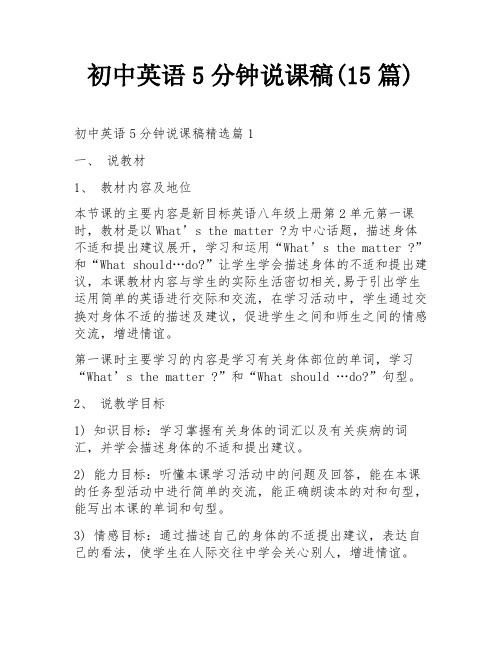
初中英语5分钟说课稿(15篇)初中英语5分钟说课稿精选篇1一、说教材1、教材内容及地位本节课的主要内容是新目标英语八年级上册第2单元第一课时,教材是以What’s the matter ?为中心话题,描述身体不适和提出建议展开,学习和运用“What’s the matter ?”和“What should…do?”让学生学会描述身体的不适和提出建议,本课教材内容与学生的实际生活密切相关,易于引出学生运用简单的英语进行交际和交流,在学习活动中,学生通过交换对身体不适的描述及建议,促进学生之间和师生之间的情感交流,增进情谊。
第一课时主要学习的内容是学习有关身体部位的单词,学习“What’s the matter ?”和“What should …do?”句型。
2、说教学目标1) 知识目标:学习掌握有关身体的词汇以及有关疾病的词汇,并学会描述身体的不适和提出建议。
2) 能力目标:听懂本课学习活动中的问题及回答,能在本课的任务型活动中进行简单的交流,能正确朗读本的对和句型,能写出本课的单词和句型。
3) 情感目标:通过描述自己的身体的不适提出建议,表达自己的看法,使学生在人际交往中学会关心别人,增进情谊。
4) 文化意识目标:用恰当的方式表达自己的看法,增进人际交往中学会关心别人的能力,了解英美国家询问和表达身体不适的习惯,培养世界意识。
3、说教学重难点重点:本节课主要学习身体部位的单词和一些疾病的词汇,以及身体不适的表达及建议。
难点:身体不适的表达及建议二、说学情初二年级的学生对英语已经有了一定的基础,但本地区部分学生对学习英语的兴趣不是很浓,在学习中,他们更喜欢从游戏中或活动中学习,这样更能提高他们的学习兴趣,让他们更轻松地掌握英语知识。
三、说教法作为教学的引导着,我遵循新课程“学生是学习的主人,一切的教学活动设计在以学生为本”的教学理念,坚持“为学生的发展,必须培养学生的自主性、能动性、独立性和创造性”的教学原则。
初中英语全英说课稿优秀9篇
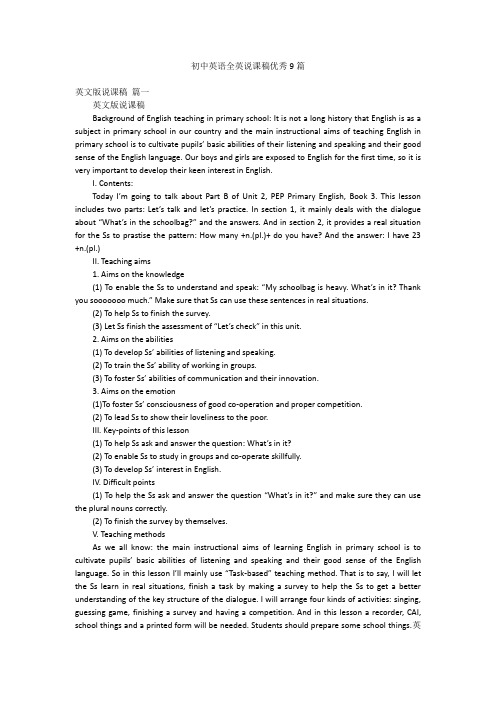
初中英语全英说课稿优秀9篇英文版说课稿篇一英文版说课稿Background of English teaching in primary school: It is not a long history that English is as a subject in primary school in our country and the main instructional aims of teaching English in primary school is to cultivate pupils’ basic abilities of their listening and speaking and their good sense of the English language. Our boys and girls are exposed to English for the first time, so it is very important to develop their keen interest in English.I. Contents:Today I’m going to talk about Part B of Unit 2, PEP Primary English, Book 3. This lesson includes two parts: Let’s talk and let’s practice. In section 1, it mainly deals with the dialogue about “What’s in the schoolbag?” and the answers. And in section 2, it provides a real situation for the Ss to prastise the pattern: How many +n.(pl.)+ do you have? And the answer: I have 23 +n.(pl.)II. Teaching aims1. Aims on the knowledge(1) To enable the Ss to understand and speak: “My schoolbag is heavy. What’s in it? Thank you sooooooo much.” Make sure that Ss can use these sentences in real situations.(2) To help Ss to finish the survey.(3) Let Ss finish the assessment of “Let’s check” in this unit.2. Aims on the abilities(1) To develop Ss’ abilities of listening and speaking.(2) To train the Ss’ ability of working in groups.(3) To foster Ss’ abilities of communication and their innovation.3. Aims on the emotion(1)To foster Ss’ consciousness of good co-operation and proper competition.(2) To lead Ss to show their loveliness to the poor.III. Key-points of this lesson(1) To help Ss ask and answer the question: What’s in it?(2) To enable Ss to study in groups and co-operate skillfully.(3) To develop Ss’ interest in English.IV. Difficult points(1) To help the Ss ask and answer the question “What’s in it?” and make sure they can use the plural nouns correctly.(2) To finish the survey by themselves.V. Teaching methodsAs we all know: the main instructional aims of learning English in primary school is to cultivate pupils’ basic abilities of listening and speaking and their good sense of the English language. So in this lesson I’ll mainly use “Task-based” teaching method. That is to say, I will let the Ss learn in real situations, finish a task by making a survey to help the Ss to get a better understanding of the key structure of the dialogue. I will arrange four kinds of activities: singing, guessing game, finishing a survey and having a competition. And in this lesson a recorder, CAI, school things and a printed form will be needed. Students should prepare some school things.英文版英语说课稿VI. Teaching procedures and purposes of my designing.I’ll finish this lesson in five steps.Step 1. Warm-up and preview1. Free talk between T and Ss about things in the classroom.2. Sing the song together: Books and pencils.3. Do some TPR, for example: Show me your English book. Show me your crayon.4. Review the numbers by asking: “How many crayons do you have?”Purpose: It is important to form a better English learning surrounding for the Ss by singing and doing some total physical response and at the same time it provides situations to review learned knowledge for the next step.Step 2. PresentationNow I’ll mainly talk about this step.1. Present the pattern: “My schoolbag is heavy.” “What’s in it?.”(1) Show a bag and say: “Look! I have a bag.” Carry it and say: “Oh, it is heavy. My schoolbag is heavy.” Help the Ss understand the meaning with the help of my body language. Then lead the Ss to read the sentence. Make sure they can say it correctly.(2) T: My schoolbag is heavy.Open the bag and say: “What’s in it? What’s in my schoolbag?”Take out a Chinese book. Then do the action again. Let the Ss read the sentence.2. Play a guessing game. Divide the whole class into four groups to have a competition.Let them guess: What’s in the bag? How many? Purpose: To present the key structures one by one is much easier for the Ss to learn and grasp the meanings. Proper competition can arouse the Ss’ interest in English learning.3. With the help of the CAI to present the dialogue. Set a situation to help Ss understand: Two Ss are coming. One girl is carrying a heavy bag on her back. They are talking.Girl: My schoolbag is heavy.Boy: What’s in it?Girl: 20 story-books, 32 pencil, 9 rulers, 12 crayons and 30 picture-books. Etc.Boy: What will you do?Girl: They are for the poor.Boy: Great! I’ll bring some school things too.The boy comes back home and puts a lot of things into the bag. Then he goes to school again and gives them to a teacher. While he is taking them out, he is counting the numbers of all things. The teacher says: Thank you soooooooo much.4. Mention that we should take care of the poor.5. Play the cassette. Let the Ss listen and imitate the dialogue.Pay attention to their pronunciation and intonation. Purpose: CAI can provide a real situation for the Ss to understand the dialogue and the relationships between people better. Tell the Ss we should show our loveliness to the Ss.Step 3. PracticeDivide Ss into groups of six children. Each one would finish the printed form by asking and answering: How many storybooks do you have? Find out which group finishes faster. Story books picture-books sharpeners crayons pencils erasers pencil-cases rulers Chen Jie 8 24 3 32 26 4 1 3Purpose: Task-based teaching method is used here to develop Ss’ ability of communication and also their ability of co-operation will be well trained.Step 4. AssessmentHelp Ss finish “Let’s check” of this unit and workbook.Purpose: To check the knowledge Ss have learned in this period.Step 5. Add-activity1. Let Ss tell each other how many school things they have after class. Tell their parents how many school things they have at home.2. Take care of everything they have.Purpose: Revision is so important that Ss should speak English as much as they as in class or after class. It is necessary for the Ss to do some extensive exercises after class to consolidate the knowledge they learned.英文版英语说课稿初中英语说课稿篇二今天我的说课内容是新目标英语八年级上册第四单元第一课时。
初中英语说课稿范文五篇
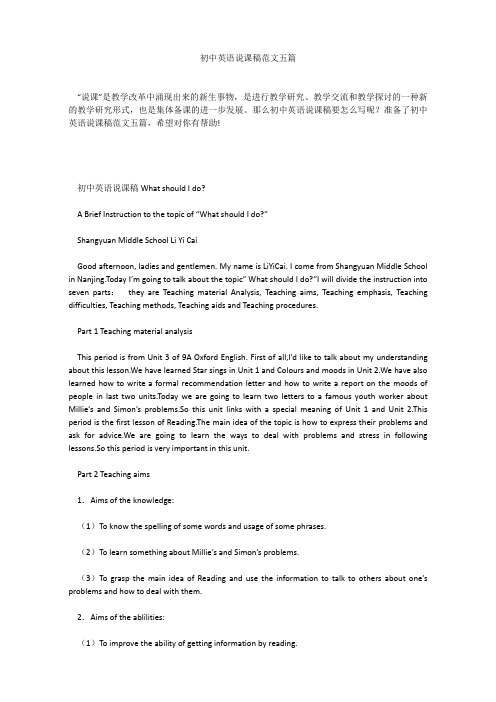
初中英语说课稿范文五篇“说课”是教学改革中涌现出来的新生事物,是进行教学研究、教学交流和教学探讨的一种新的教学研究形式,也是集体备课的进一步发展。
那么初中英语说课稿要怎么写呢?准备了初中英语说课稿范文五篇,希望对你有帮助!初中英语说课稿What should I do?A Brief Instruction to the topic of “What should I do?”Shangyuan Middle School Li Yi CaiGood afternoon, ladies and gentlemen. My name is LiYiCai. I come from Shangyuan Middle School in Nanjing.Today I’m going to talk about the topic” What should I do?”I will divide the instruction into seven parts:they are Teaching material Analysis, Teaching aims, Teaching emphasis, Teaching difficulties, Teaching methods, Teaching aids and Teaching procedures.Part 1 Teaching material analysisThis period is from Unit 3 of 9A Oxford English. First of all,I’d like to talk about my understanding about this lesson.We have learned Star sings in Unit 1 and Colours and moods in Unit 2.We have also learned how to write a formal recommendation letter and how to write a report on the moods of people in last two units.Today we are going to learn two letters to a famous youth worker about Millie’s and Simon’s problems.So this unit links with a special meaning of Unit 1 and Unit 2.This period is the first lesson of Reading.The main idea of the topic is how to express their problems and ask for advice.We are going to learn the ways to deal with problems and stress in following lessons.So this period is very important in this unit.Part 2 Teaching aims1.Aims of the knowledge:(1)To know the spelling of some words and usage of some phrases.(2)To learn something about Millie’s and Simon’s problems.(3)To grasp the main idea of Reading and use the information to talk to others about one’s problems and how to deal with them.2.Aims of the ablilities:(2)To improve the ability of retelling the story.3.Aims of the emotion:(1)To understand how to write about problems and to express feelings.(2)To ask for advice to solve the problems.Part 3 Teaching emphasis1.To master the ‘to’-infinitives and ‘wh-’words+‘to’-infinitives.2.To get the ability of general reading and getting information.Part 4 Teaching difficulties1.To recognize and understand vocabulary about problems.2.To ask for advicePart 5 Teaching methodsIn this topic,I will use five-step Teaching Method and Task-based language Teaching.I design some tasks to help the students learn.I think if I want to improve the students’ oral English,I should give them enough chances to practice and I will use pair work,group work to let the students take an active part in all kinds of activities.That is “Learning by doing,learning by using”.Let the students be the masters of the class teaching,thus,student-centered teaching method is well shown.Part 6 Teaching aidsProjector,slide show,tape recorder and blackboardPart 7 Teaching procedureStep Ⅰ.Lead-inThe purpose is to arouse the students’interest of study.Let’s have a free talk.T:Have you got problems?S:Yes.S:Eating too much makes me unhealthy.T:What about you?S:……Step Ⅰ.PresentationThe purpose is to develop the skills of skimming and how to gain the main idea of the articles. 1.Ask students to read two letters and answer the following questions:①What is Millie’s favorite hobby?(Painting)②What is Millie’s problem?(She doesn’t have enough time for hobbies and home work.)③When does Simon play football?(After school until late)④How do his parents feel about it?(They don’t like this and ask him to go home before 6 p.m.)2.Ask students if there are words that they do not know.Explain some new words briefly.deal;choice;complete;refuse;accept;spare;doubt;whether;Step Ⅰ.PracticeThe purpose is to develop the skills of scanning and how to gain the details from the articles. 1.Listen to the tape and answer some question about “True”or“False”.2.Ask students to read the articles again and explain some important phrases.How to solve the problems;hand in;on time;at the moment;can’t find any time for my hobbies;feel bad;give up;achieve a balance between the two;hear form;make unhappyStep Ⅰ.Retelling1.Ask students to make sentences with phrases that we have learned.2.Try to retell the outline of the articles.3.Encourage students to say something about themselves.Step Ⅰ.Summary and homeworkThe purpose is to give the students a clear idea of how to express their problems and revise the articles.1.Ask students to revise the words and phrases2.Ask students to write a letter about himself after class.During my teaching,I’ll try my best to get my class alive and encourage the students to talk with each other in English. I think the general aim of English teaching is to improve the ability of using English. And I’ll use this to guide my teaching.Thank you!牛津英语9A Unit 3说课稿一、说教材:1、教材简析:我说课的内容是江苏牛津中学英语教材9A第3单元Teenage problems中的Integrated skills 部分。
初中英语说课稿范文教研(3篇)
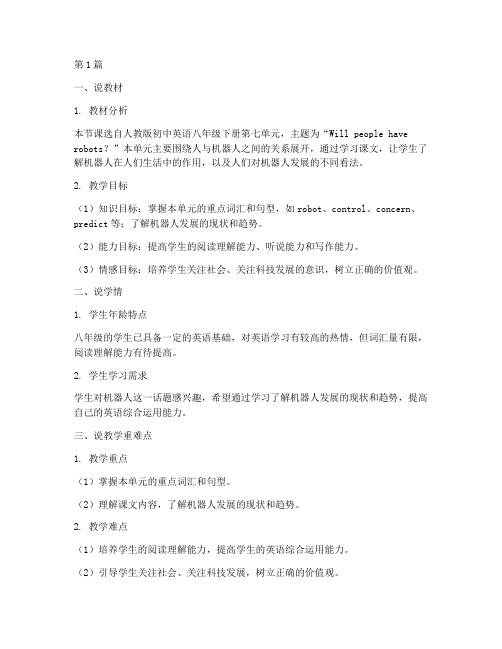
第1篇一、说教材1. 教材分析本节课选自人教版初中英语八年级下册第七单元,主题为“Will people have robots?”本单元主要围绕人与机器人之间的关系展开,通过学习课文,让学生了解机器人在人们生活中的作用,以及人们对机器人发展的不同看法。
2. 教学目标(1)知识目标:掌握本单元的重点词汇和句型,如robot、control、concern、predict等;了解机器人发展的现状和趋势。
(2)能力目标:提高学生的阅读理解能力、听说能力和写作能力。
(3)情感目标:培养学生关注社会、关注科技发展的意识,树立正确的价值观。
二、说学情1. 学生年龄特点八年级的学生已具备一定的英语基础,对英语学习有较高的热情,但词汇量有限,阅读理解能力有待提高。
2. 学生学习需求学生对机器人这一话题感兴趣,希望通过学习了解机器人发展的现状和趋势,提高自己的英语综合运用能力。
三、说教学重难点1. 教学重点(1)掌握本单元的重点词汇和句型。
(2)理解课文内容,了解机器人发展的现状和趋势。
2. 教学难点(1)培养学生的阅读理解能力,提高学生的英语综合运用能力。
(2)引导学生关注社会、关注科技发展,树立正确的价值观。
四、说教法1. 交际法通过创设情境,让学生在真实的语境中运用英语进行交流,提高学生的听说能力。
2. 任务型教学法设计丰富多彩的任务,让学生在完成任务的过程中学习知识,提高综合运用英语的能力。
3. 合作学习法通过小组合作,让学生在交流、讨论中共同解决问题,培养学生的团队协作精神。
五、说学法1. 自主学习法鼓励学生课前预习,自主查找资料,为课堂学习做好准备。
2. 合作学习法在课堂上,引导学生积极参与小组讨论,共同完成任务。
3. 探究学习法通过提问、思考、讨论等方式,引导学生主动探究知识,提高学生的思维能力。
六、说教学过程1. 导入新课(1)利用多媒体展示机器人图片,激发学生的学习兴趣。
(2)提问:What do you think of robots?引导学生思考机器人与人类的关系。
- 1、下载文档前请自行甄别文档内容的完整性,平台不提供额外的编辑、内容补充、找答案等附加服务。
- 2、"仅部分预览"的文档,不可在线预览部分如存在完整性等问题,可反馈申请退款(可完整预览的文档不适用该条件!)。
- 3、如文档侵犯您的权益,请联系客服反馈,我们会尽快为您处理(人工客服工作时间:9:00-18:30)。
初中英语说课稿初中英语说课稿精选初中英语说课稿精选(一)一、教学目标:1. 语言知识目标:1)复习与运用所学的有关天气的相关知识来描述天气。
2)能正确地描述他人正在进行的活动。
3)能根据所提供的相关材料描写某地的天气情况及某人正在进行的活动。
2. 情感态度价值观目标:教育学生善于观察天气,善于调整自己的情绪;了解世界各地的天气情况,增加世界观念。
知道大自然的力量是神奇而伟大的,我们应当好好学习,立志学好科学知识,为长大后探索神奇的大自然,打好基础。
二、教学重难点1. 教学重点:1)综合运用所学的知识,完成短文,描述某地的天气及某些人物正在进行的活动。
2)能运用所学的知识,来描述某地的天气及某人正在进行的活动。
2. 教学难点:能运用所学的知识,来描述某地的天气及某人正在进行的活动。
三、教学过程Ⅰ。
Warming- up and revision1. Have a dictation of the new words and expression learned in Section B.2. Let some Ss read the postcards in 2b.3. Watch a video program about the weather forecast.Ⅱ。
Presentation1.Show some pictures on the big screen and present some new words and expressions in this period.(skate, snowy, winter, Russian, snowman)2. Ss read the new words and try to remember them.Ⅲ。
Free talkFinish some exercises.Ⅳ。
Writing1. T: Here's another postcard from Kate to Xiao Lu. Look at the pictures on the postcard. How's the weather there? And what is the girl doing?Let some Ss answer the two questions.2. Let some Ss read the words in the box. Explain the meaning of the words that they don't know.3. 思路指导:首先,应读方框里的单词,掌握每个单词的意思。
其次,通读一遍短文,理解短文大意。
然后,认真读每个句子,分析每个空格处前后上下文的意思,确定空格处所缺单词的意思。
如:第一、二两空格前有weather一词,可知空格处只应填snowy和windy一词。
第三空格后面有"俄罗斯面包"一词可推知,空格处应为buying一词。
第四空格由空格后面的on a river可知应是"skate"一词。
最后一空格是take a photo of …,应用现在进行时态,故填taking.4. 学生们在老师的指导方法下,读信的内容,然后补全短文内容。
5. Check the answers.V. Writing1. Imagine you are on vacation. Write notes about your vacation.2. Let some Ss read the questions aloud.3. Make sure Ss know the meaning of the questions.4. Ss think and write down some notes about their vacations.5. Let Ss read out their own vacation notes.VI. Writing1. Write a postcard to a friend. Tell your friend about your vacation and what you are doing.2. 写作指导:回想一下给你印象最深的一次度假活动。
可以将在3b中问题的答语,做为写作的内容。
假想你现在正在度假。
将回答问题的几个句子连起来,形成一个语句连贯的短文。
注意,应用现在进行时态来表述现在正在发生的事情。
3. 学生们根据老师的指导方法,大胆地进行写作,发挥自己的想像力,写出好的内容。
4. Let Ss read their postcard to the class.VII. Self Check 11. Tell Ss we've learned some words about feelings, weather and activities. Now discuss with your partners. Add more words in the box.2. Ss work in pairs and add more words in the box.3. Let some Ss read their words. Let other Ss add more words.VIII. Self Check 21.Read the sentences below on the left and find the responses on the right.2.思路指导:首先,应通读所有选项,掌握对话的大意。
可知本对话是一个打电话的情景,由打电话的`常识可知左栏第一句话为首句,句意为"你好,我是詹妮"可知答语应是右栏中的第二句话。
由左栏第二句末的"我可以给她带个话吗?"一句可以确定其答语为右栏中的第三句话,"好的。
你可以让她打电话876-54321吗?".当A方回答"没问题"后,B方应当表示感谢。
3. Ss read the sentences below and find the responses.4. Check the answers with the class. Then let the Ss practice the conversation with a partner.IX. Self Check 31. Put these sentences in order to make a conversation. Then write your own conversation.2. 思路指导:本题要求将一对话排列正确的说话顺序。
首先,通读所有的句子,理解对话的大意。
其次,在通读对话的基础上确定对话的首句应是打招呼的"Hi, Jill"一句。
接下来,就可以确定"Not too bad."是第二句。
比较询问天气的问句和询问在下雨天里在做什么事情,可知应先问天气情况。
最后,通读一遍对话,看是否通顺。
3. 学生们按指导方法,将对话的顺序排好。
然后和伙伴练习这个对话。
4. 与伙伴共同编造一个与之相仿的对话。
并向本小组的其他同学表演一下。
Homework找一张你度假时照的照片,写一篇小短文向你的同学们介绍一下当时你度假的情况。
包括以下内容如下:在何地度假天气情况你们正在进行的活动你对假期的感受板书设计:初中英语说课稿精选(二)一、说教材(教材分析) Analyzing teaching material1. 说课型lesson type (Dialogue/ reading/ listening/ revision)2. 本课在教材中的地位 status and functionLesson 33 Saving the Earth is a dialogue. The lesson is focused on the topic of the problems of the earth and the functional items of Supposition/ Intentions/ conjecture/ Prohibition. Since it is a dialogue / reading. It’s helpful to improve the Ss communicative/ reading ability.3. 说教学指导思想 teaching guideline(Teaching syllabus: Language is for communication, develop their four skills, lay special emphasis on reading; Grellet put it well in his book developing reading skills: develop reading skill/ discourse analysis; get them to understand the western culture better; improve the ability to discover, analyze & solve the problems; Reading is for information, for fun; Use Top- down model or Bottom- up model to activate Ss schemata; Interactive model)4. 说教学目标和要求Teaching aims and demands (…be intended for Ss in key schools)1)认知目标 knowledge objectsa. Enable the Ss to remember the following new words & phrases:Damage, lecture, pollute, pollution, room, standing room, be fit for, hear about, turn intob. Get the Ss to be familiar with this sentence pattern:If the population keeps growing so quickly, there will only be standing room left…Give the Ss a reinforced practice on the functional item Supposition.c. Activate Ss schemata regarding the topic of pollution and help Ss to know more about the problem of pollution.2)智能目标 ability objectsa. Ask the Ss to make up a similar dialogue.b. Help them to understand the dialogue better and improve the four skills.c. Develop their ability of thinking independently.d. Cultivate their ability to discover, analyze and solve problems.e. Train them to collect information from the Internet.f. Train them with some effective learning methods to optimize Ss’ learning results.3)德育目标 moral objectsa. Arouse their interest in learning English;b. Help them to understand the background of pollution.c. Enable the students to love our earth and the nature.d. Be aware of the importance of stopping pollution & protecting out environment.e. Encourage the Ss to do something to save the earth.5. 说教学重点 teaching important points (生词、句型;培养阅读技能)a. New words and phrasesb. Sentence pattern: If- clausec. improve their reading skills.d. Talking about problems of the Earth.6. 说教学难点 teaching difficult points (语法;发展交际能力)a. functional item: Supposition.b. Develop their communicative ability. Act out their own dialogue.7. 说教具teaching aids (multi-media computer, software, OHP)The teaching syllabus says that it’s necessary for teachers to use modern teaching facilities. It’s of great help to increasethe class density and improve our teaching result. It can also make the Ss reach a better understanding of the text by making the classes lively and interesting. At the same time, it arouses the Ss’ interest in learning English.二、说教法 Teaching methodsFive step method; audio-video; communicative approach;Task-based learning: New Syllabus Design encourages teachers to use this teaching method. TBLT can stimulate Ss’ initiative in learning and develop their ability in language application. Make the Ss the real masters in class while the teacher himself acts as the director and bring their ability into full play.三、说学法 Study methods1. Teach Ss how to be successful language learners.2. Teach Ss how to develop the reading skill — skim & scan; how to communicate with others; how to learn new words; how to learn independently;3. Get the Ss to form good learning habits.四、说教学过程T eaching proceduresI. 复习(Revision)5min (Daily report; 词汇diagram; brainstorming; activate schemata)Activity 1: Imagination1)。
